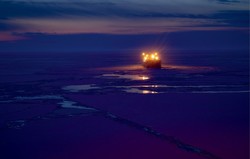The Cure For the Resource Curse
On the domestic level, Russia is constrained by the uncertainty of the profitability of recently discovered fields. Although Russia’s energy reserves have proven to be vast, so too are the geological challenges that must be overcome to extract them. Most of the newly discovered fields lie deeper than those found earlier. In addition, Russia’s resource curse creates a ‘catch-22’ situation – the country needs to diversify its economy, but the only way this can be accomplished is through the delivery of rents from the energy sector. The central paradox of this strategy is that Russia needs to continue investing in its fossil fuel economy to finance programs that could lessen Russia’s reliance on energy and the volatility of the energy markets.
On the international level, Russia is overly reliant on exporting non-renewable resources. This puts Russia in a subordinate relationship with its customers, and ultimately undermines its sovereignty. As was demonstrated by the Russian-Ukrainian gas conflicts, any potential energy weapon is a ‘double-edged sword.’ The ‘gas wars’ showed that the relationships between energy producers and consumers are symbiotic. The standoff weakened Russia’s reputation as a reliable supplier and encouraged European states to look for alternative supply sources.
One alternative supply source is the proposed Transatlantic Trade and Investment Partnership (TTIP) between the United States and the European Union. The TTIP would create a stronger economic bloc between the U.S. and the EU, and promote the export of energy and raw materials from the former to the latter. If the TTIP eases European access to the new gas generated by U.S. fracking, it will benefit both European consumers and American suppliers, and substantially diminish the EU’s dependence on natural gas from Russia.
Russia supplies less than 10% of global oil and gas. With such a low market share, it is hard for Russia to achieve ‘superpower’ status in leveraging the global market. Only through collusion with other producers could there be any risk of Russia exerting a serious influence in cornering the energy market. As a non-member of OPEC, Russia has not even attempted to coordinate its actions with the organization, and there has been little success in creating a natural gas version of OPEC.
We believe that Russia could successfully address these issues through global energy governance institutions. Russia’s preference would be to create a new energy regime – most likely under the umbrella of the BRICS – rather than to participate in institutions constructed by the West.
There is a plethora of overlapping institutions that attempt to address the issue of energy market coordination. Some of the energy-related issues have never been dealt with on the basis of equality. For example, one of the most influential organizations, the International Energy Agency (IEA), was established by OECD states when these countries had high oil demand. Today, the geography of oil and gas production has shifted predominantly to non-OECD countries, with IEA members accounting for only about half of world demand. One of the weaknesses in global energy governance, therefore, is the divide between developed and developing countries, where some of the key players are excluded from cooperation.
Additionally, Russia has invested considerable time and energy in dealing with Western institutions. Initially, it attempted to construct its image as a Western state by aligning itself with Western powers. This period, from Moscow’s perspective, was used by the West to expand its sphere of influence in Central and Eastern Europe and the former Soviet Republics. When Russia was invited to participate in Western regimes, it was on ‘Western terms.’ Talks with Russia expanded at the G8, but mainly on non-economic issues. However, Russia was excluded from the discussions on financial decisions, thereby limiting its influence.
The BRICS could provide an alternative platform for Russia’s energy security strategy. Considering that China and India are among the largest energy consumers, the bloc could serve as a forum for addressing energy related issues of both producers and consumers. Moreover, the BRICS could serve as a platform for amplifying the bargaining power of its member states with outside regimes and states. The power of the BRICS’s five emerging economies could be helpful for Russia in pushing back against Western domination and the construction of an alternative global order, including energy regimes.
Russia is constrained by the uncertainty of the profitability of recently discovered fields. Although its energy reserves have proven to be vast, so too are the geological challenges that must be overcome to extract them. In addition, Russia’s resource curse creates a ‘catch-22’ situation – the country needs to diversify its economy, but the only way this can be accomplished is through the delivery of rents from the energy sector. The central paradox of this strategy is that Russia needs to continue investing in its fossil fuel economy to finance programs that could lessen Russia’s reliance on energy and the volatility of the energy markets













